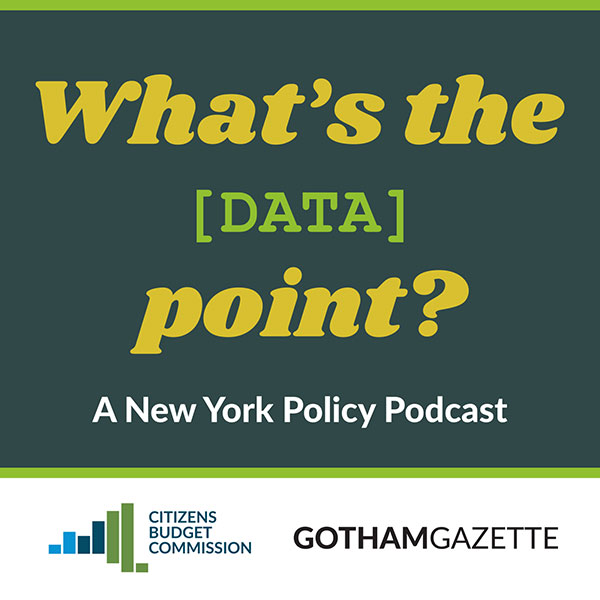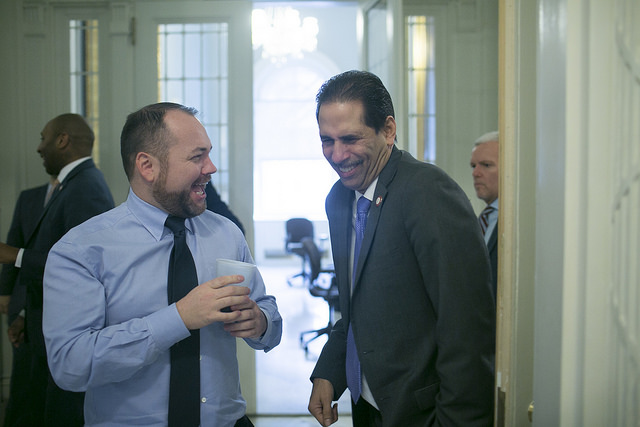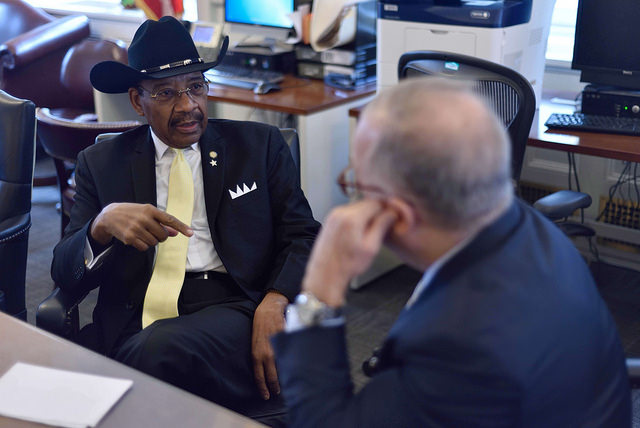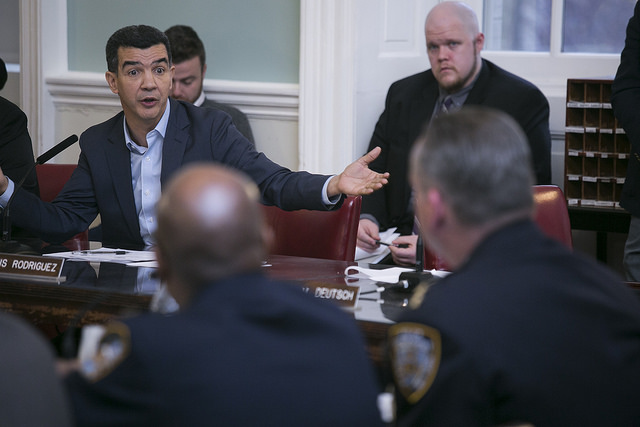What's The [Data] Point? $72.4 Billion, with Charles Brecher

What's The [Data] Point? Episode 30 -- $72.4 Billion, with Charles Brecher [You can download What's The [Data] Point? wherever you get your podcasts, including on iTunes]

Health care policy and health care funding are among the most pressing issues facing the country, state, and city. Chuck Brecher is an expert on those and related topics, having been research director at Citizens Budget Commission for more than 30 years and now health policy advisor for CBC. Brecher joined the podcast to discuss recent news out of Washington, D.C. that is important to New York, as well as a variety of health care related issues facing New York State and City.
Listen to the conversation and let us know what you think: Ben Max of GG (@TweetBenMax), Maria Doulis of CBC (@MariaDoulis) and guest Charles Brecher. Listen below or download wherever you get your podcasts!
***
by Ben Max, Gotham Gazette
@tweetBenMax @GothamGazette
Anti-LGBT City Council Members Given Prominent Positions

Above: Corey Johnson and Fernando Cabrera (photo: William Alatriste) (photo below: John McCarten)
When new City Council Speaker Corey Johnson, the first openly gay and openly HIV-positive person to hold the powerful position, unveiled his leadership team and Council committee assignments, he appointed two anti-LGBT Council members to chair committees, and named one to senior leadership in the 51-member legislative body. The moves seemed to have raised few eyebrows despite the stark contrast with Johnson’s life story and politics, as well as the politics of the overwhelming number of Council members.
Johnson created a new committee for Council Member Ruben Diaz Sr., a conservative reverend who will chair the Committee on For-Hire Vehicles, and named Council Member Fernando Cabrera, also a socially conservative pastor known to hold anti-gay views, to lead the Committee on Governmental Operations and serve as the majority whip on Johnson’s senior leadership team.
Both members, who represent districts in the Bronx, are outliers in the largely progressive body, holding far-right stances on LGBT rights and social issues in general. Their politics seem out of place not only in the City Council but in an overwhelmingly liberal city where Republicans often nominate socially progressive candidates and vote along the same lines. Notably, the Bronx Democratic County organization was key to supporting Johnson’s winning speakership bid, and a number of Bronx members were rewarded in kind when it came to committee and leadership assignments.
Diaz Sr., a former state Senator and minister who founded the Christian Community Neighborhood Church, was the sole dissenting Democratic Senator on the state Legislature’s successful marriage equality bill passed in 2011. The bill was supported by four Republicans who were in the Senate majority. Diaz Sr. also voted against the Gender Expression Non-Discrimination Act (GENDA) last year in a Senate committee vote, is a vocal opponent of abortion and, in 2003, sued the Department of Education over plans to expand the Harvey Milk High School in Manhattan for gay students.
Cabrera, the senior pastor at the New Life Outreach International church, has his own history of controversial statements and positions. In 2014, when he was serving his second term on the City Council, he praised the Ugandan government in a video posted online after it passed a law that criminalized homosexuality.
"Godly people are in government," Cabrera said of the country’s government, noting that gay marriage was not acceptable there and stating that the government had withstood pressure from the U.S. to allow it. “And they have stood in their place. Why? Because the Christians have assumed the place of decision-making for the nation.”
Following a furor over his remarks in 2014, he later insisted, “I do not support the persecution of gays and lesbians anywhere, whether it's in Uganda or right here in New York State.”
[Read: City Council Names New Leadership, Committee Chairs and Members]
For people familiar with Speaker Johnson’s personal history, which he wears on his sleeve, the move to empower the two conservative Council members could easily trigger a degree of cognitive dissonance. Johnson became famous as a teenager when he came out as gay while the captain of his high school football team in Massachusetts, and has often approached politics and legislation from the lens of his own lived experience. He represents a Manhattan district including Chelsea and the West Village, home to the gay rights movement and many of its leaders, including former State Senator Tom Duane, who Johnson has called a role model and mentor.
“For decades, the gay activist community has fought to keep people like Ruben Diaz Sr. and Fernando Cabrera out of positions of power,” said Allen Roskoff, a gay activist and president of the Jim Owles Liberal Democratic Club, in a phone interview. “I find this shocking and cringeworthy.”
Several activists and elected officials were hesitant to criticize Johnson, whose election was celebrated by the LGBT community. But, Roskoff was not alone in his displeasure.
"Of course it's a big deal," said an LGBT Democratic insider, who requested anonymity to speak freely. "You have hate emanating from Washington on a daily basis; on the ground in New York City, bias attacks are happening more often; and to put two vocally anti-LGBT people in places where they have a bigger platform is really worrying and not something we want to see in a progressive body."
The insider also pointed out that Diaz Sr.'s and Cabrera's neighborhoods are where LGBT youth have long felt especially unsafe and unaccepted, and that those same young people need elected officials to be leaders for them, not spreading anti-LGBT sentiment that makes them less safe.
Assemblymember Deborah Glick, New York State’s first openly gay legislator, was similarly disappointed, though she said she did not want to “second guess” Johnson’s decisions as speaker.
“I was pleased to have Reverend Diaz removed from the Senate Democrats because his anti-choice and his anti-LGBT attitude and aggressive rhetoric was destructive and unpleasant,” she said. “I’m sorry they’re in elected office. Just as I would not want to spend time and energy seeing that people who are actively homophobic are not elected to seats in other parts of the country, I’m not happy to see them in elected office here. You would have to ask the speaker what went into his thinking in giving them prominent positions.”
Gotham Gazette did ask Johnson about the decision on January 11, shortly after the new committee chairs were approved by the full Council. Though he insisted that he disagrees with Diaz Sr.’s and Cabrera’s positions on LGBT issues, he said that just as he does with certain Republican Council members and those within his own Democratic caucus, his new position as speaker requires him to treat each member equally.
“I’m gonna treat every member of this body with respect...Everyone knows where I stand on LGBT equality. No one can question my credentials on LGBT equality and I’m the Speaker of the Council and we’re going to push the envelope to expand protections for all New Yorkers, transgender New Yorkers, LGBT new Yorkers, undocumented immigrants, Muslims, people of different religious faiths and beliefs,” he said. “That’s where I stand. I don’t agree with every member on everything but I’m still going to work collegially with every member of this body because that is part of my job now as Speaker of this Council.”
He also said that Cabrera’s view didn’t necessary align with his votes. Indeed, Cabrera voted in favor of a bill last year that banned gay conversion therapy in the city and supported a bill requiring the Department of Health and Mental Hygiene to create a plan to provide behavioral health services to LGBT individuals. Durign the race to become Speaker, Johnson caught some flack for visiting Diaz Sr. in the hospital, a visit that Diaz Sr. referenced on the day Johnson was officially elected Speaker.
Fellow Council members -- including LGBT members such as Ritchie Torres, Jimmy Van Bramer and Carlos Menchaca -- also came to Johnson’s defense, insisting that conservative members would hardly have an effect on the larger policy agenda or leanings of the Council as a whole.
“The foundation of this body requires us to listen to all sides of every issue and that’s what we’re going to be committed to this next session,” said Council Member Menchaca in a brief interview outside City Hall last week.
Council Member Van Bramer similarly said, “There’s good things that can come out of appointing a leadership team that is diverse and has opinions that contradict your own.”
Council Member Brad Lander, not a member of the LGBT caucus, echoed the view. “As long as the policies that we pursue represent the progressive values that [Speaker Johnson] articulated, that he continues to articulate, then I think it’s great to have a diverse leadership team in many ways,” he said.
Council Member Torres, from the Bronx, called Gotham Gazette upon hearing of the reporting of this article to show support for the speaker. The two members in question, he said, represent some of poorest districts in the city where it is a “particular imperative” to show equal representation. “I think it’s unreasonable to expect the Speaker of the Council to deny resources to lower-income districts simply because he rejects the social views of those who represent them. It’s unfair to begrudge the speaker for his obligation to represent everyone equally,” he said.
 Torres also refuted the possibility that the two members were rewarded for their support for Johnson’s ascension to the speakership, which owed to the backing from the Bronx and Queens County Democrats, as well as other members whose support Johnson had secured. Council members from both counties were handed the most powerful Council committees, with the land use committee going to Council Member Rafael Salamanca of the Bronx and finance to Queens Council Member Daniel Dromm, who is a member of the LGBT caucus.
Torres also refuted the possibility that the two members were rewarded for their support for Johnson’s ascension to the speakership, which owed to the backing from the Bronx and Queens County Democrats, as well as other members whose support Johnson had secured. Council members from both counties were handed the most powerful Council committees, with the land use committee going to Council Member Rafael Salamanca of the Bronx and finance to Queens Council Member Daniel Dromm, who is a member of the LGBT caucus.
“I think [Speaker Johnson’s] magnanimity transcends the normal transactions of the speaker race,” Torres said, noting that even though he also ran for speaker, he was given a plum position as chair of the newly empowered oversight and investigations committee. “I would do exactly what he’s doing as speaker,” he added.
“Winning coalitions reward their members,” observed one Council Member, who asked to remain unnamed.
Assemblymember Glick conceded that the speakership is a complicated position that requires keeping numerous stakeholders satisfied. “I’ve been in politics a long time and I understand that people in positions of authority have a very tough balancing act,” she said. “By the same token, I’m not happy about seeing people who have engaged in hateful rhetoric being given what in political terms would be seen as a reward.”
Regardless, she said, “I’m very proud of Corey. I consider him a friend and I will do whatever I can to make his tenure a successful and positive one.”
***
by Samar Khurshid, senior reporter, Gotham Gazette
@samarkhurshid @GothamGazette
(picture inset: Ruben Diaz Sr.; photo by John McCarten)
Note - this article has been updated to clarify that Diaz Sr. was the sole Democratic Senator, not the only Democratic legislator, to oppose the state's marriage equality bill.
City Council Oversight Hearing on Policing Protests Dominated by Disputes

City Council Member Rodriguez (photo: William Alatriste)
The City Council Committee on Public Safety held an oversight hearing on Wednesday to examine the NYPD’s tactics and procedures regarding protests and crowd control. The perpetually controversial issue has come to the fore once again in the wake of immigrant activist Ravi Ragbir’s detention by U.S. Immigration and Customs Enforcement (ICE) and the NYPD’s subsequent aggressive handling of protesters, culminating in the arrests of two City Council members and 16 others on January 11.
Both Council members who were arrested, Ydanis Rodriguez and Jumaane Williams, Democrats of Manhattan and Brooklyn, respectively, sit on the public safety committee and questioned NYPD officials at Wednesday’s hearing, which was led by committee Chair Donovan Richards, a Queens Democrat.
Williams was released by the NYPD with a desk appearance ticket but Rodriguez was arraigned in court on charges of disorderly conduct, resisting arrest, reckless endangerment, and obstructing emergency medical services. Rodriguez, on the day of the protest, tweeted a picture of what he claimed to be an NYPD officer holding him in a chokehold.
Despite this, the hearing focused less on the allegedly brutal tactics employed by the NYPD in protests and focused more on the department’s alleged coordination with ICE. There was some discussion of the department’s approach to crowd control, though, part of a history that includes the NYPD having been accused of inappropriate suppression or brutal tactics against protesters involved with Black Lives Matter, Occupy Wall Street, antiwar demonstrations, and opposition outside the 2004 Republican National Convention.
But the hearing largely devolved into exasperated quibbles between Council members and NYPD representatives over the basic facts of what happened on January 11, including whether the department was coordinating with ICE it its detainment efforts.
The hearing is the first public safety hearing to be chaired by Richards, who was named to the post by new Council Speaker Corey Johnson, who was part of the January 11 demonstrations but was not arrested. Johnson did have a tense exchange with one officer, who he pursued and reported to NYPD Commissioner James O’Neill for aggressive conduct. Johnson and O’Neill discussed the totality of the day, Johnson said soon after, and the NYPD is continuing its internal investigation of officer conduct.
From the moment it began, the hearing was heated, as Council members and the NYPD officials testifying engaged in several disputes of the facts related to January 11 and to policy areas where Council members deemed the NYPD to be inadequately performing their duties.
It was noted that the NYPD’s Strategic Response Group, a unit of nearly 700 officers that is deployed to maintain crowd control at demonstrations, has under its purview counterterrorism, a combination that worried Council members who feared that empowering officers trained in combating terrorism with monitoring protests would result in overly aggressive policing of the latter.
The department noted that the unit was created, under the direction of former Commissioner Bill Bratton, in response to large-scale terror incidents in places such as Paris and Mumbai. Bratton’s pitch at the time: “Safe from crime, safe from terrorists, safe from disorder.”
When Richards asked if the NYPD views peaceful protesters and terrorists as posing similar threats to public safety and order, the NYPD representatives were evasive, saying that the department required a reserve of officers able to respond to terror incidents, trained in disparate areas of policing like making mass arrests and handling hazardous substances.
Stephen Hughes, Commanding Officer of Patrol Borough Manhattan South, stated that in 2017, SRG had made 322 arrests at 109 demonstrations. The NYPD’s legislative director, Oleg Chernyavsky, stated that those are just arrests made by SRG, and that other patrol units can make arrests that are not counted toward that total.
Several Council members all but accused the NYPD representatives of lying under oath in saying they had not been coordinating with ICE during the January 11 incident. The officers repeatedly asserted that they had not been deputized as immigration officers and were not coordinating in any way with ICE, as per department policy. Williams attempted to refute this narrative by showing a picture of NYPD and federal Department of Homeland Security officers appearing in the immediate vicinity of each other.
“I’m hoping that what happened wasn’t intentional,” Williams said. “And I want to prevent it from happening again.”
Chernyavsky rebutted the notion that being in the same vicinity meant the two agencies were coordinating.
“I think the fact that we were physically present standing next to a federal officer who was outside of, I would assume, his or her place of employment, was an unintentional consequence,” Chernyavsky said. He also asserted that NYPD had become more active in crowd control and making arrests when its task became escorting an ambulance, with Ragbir in it, out of the crowded streets near the downtown federal building where he had had a check-in with immigration officials (there is some dispute about whether Ragbir was actually suffering from any ill feelings and in need of an ambulance). Chernyavsky said NYPD officers were unaware initially that the person in the ambulance was in ICE detention, and claimed that they even went to the wrong hospital at first, a point he thought would bolster the notion that the NYPD was not coordinating with ICE.
“What happened that day was some kind of coordination, period,” Williams said, growing increasingly frustrated with the NYPD reps as Chernyavsky asserted that it’s “irresponsible to allege that we coordinated with immigration enforcement.” They instead repeatedly asserted that they were simply enforcing existing local laws related to protest and crowd control management. They said that the events had unfolded quickly and in chaotic fashion.
The Council members signaled that they had hoped to have a more constructive dialogue about the NYPD’s policies and rules of engagement but were instead having a debate over what the facts were.
Council Member Brad Lander, a Democrat from Brooklyn, also grew increasingly frustrated with the NYPD officials as his line of questioning went on. Lander was incredulous towards the NYPD claim that it was not coordinating with immigration enforcement despite having provided ICE, which was transporting Ragbir, with a police escort from Bellevue Hospital to the Holland Tunnel, which occurred after Ragbir had briefly been at the hospital.
“Up to that point, you guys were responding to a protest,” Lander said, referring to the NYPD’s insistence that they were enforcing local laws. “But at Bellevue, there was no protest.” He also noted that there was no health risk for Ragbir at that point, a justification for Ragbir’s transport by ambulance with ICE on scene. The officers contended that they were not escorting ICE, but rather were simply “present at transport” due to the potential presence of protesters, who ended up not following the ambulance Bellevue or federal officials to the Holland Tunnel. Lander contended that there was no difference between the two.
“Really?” he asked, growing impatient with NYPD testimony.
“I’m more concerned walking out of this hearing than I was walking into it,” Lander said before being interrupted several times. Lander chastised the department for failing to own up to its role in Ragbir’s detention, and for not being apologetic and acknowledging the mishaps.
Local Law 228, which forbids city law enforcement officials from cooperating with ICE by being deputized as federal immigration officers, and requires the NYPD to report the number of federal detainer requests it receives, recently went into effect. An NYPD rep noted that the department did not comply with a single detainer request from ICE out of the 1,526 it received in 2017, as President Donald Trump ramped up immigration enforcement. In 2016, Barack Obama’s last full year as president, the NYPD received 80 detainer requests and complied with two.
Law 228 was passed in November but went into effect on January 30, 19 days after the Ragbir detention and subsequent protests. Williams called this “quite a coincidence,” but the NYPD reps assured the Council members that their prior internal department policy was to not coordinate or comply with ICE. They reiterated several times that they had not complied with a single detainer request of the 1,526 that were submitted by federal authorities to the NYPD, and that the only instances where the NYPD actively works with ICE are on task forces that are related to a different policy area that both NYPD and ICE agents happen to work on, such as human trafficking or the opioid epidemic.
The arrest and detention of Ragbir, who has had a detainer against him since 2006 as a result of a fraud conviction, at a routine check-in with immigration authorities has been extremely controversial among New York’s activist and political community. Ragbir, after a stint in ICE detention in Miami, is back in New York but faces another check-in on Saturday during which he could face deportation. With the Trump administration’s significant uptick in immigration enforcement, particularly against undocumented immigrants who have not committed felonies, ICE has been making sweeps in immigrant neighborhoods and at courthouses with or without the NYPD’s cooperation.
On Wednesday, Mayor Bill de Blasio sent a letter to Thomas Decker, the Field Office Director for New York’s ICE office, extolling Ragbir and pleading that he not be deported back to Trinidad, while also making the case that aggressive immigration enforcement in immigrant communities and courthouses is deteriorating trust between immigrant communities and law enforcement. De Blasio did not mention Ragbir’s prior conviction.
“These activities not only create fear in immigrant communities, but undermine public safety,” the letter read. “New York City is the safest big city in America because of the trust between law enforcement and communities, including immigrant New Yorkers. When ICE takes aggressive action against leaders in immigrant communities, it casts a chilling effect on immigrants’ willingness to engage with government and law enforcement generally, undercutting that trust.”
“The safety and interest of New Yorkers should be central to any determination concerning Mr. Ragbir, or other individuals arrested by ICE,” the letter continued. “Therefore, I request that ICE exercise its discretion to permit Mr. Ragbir to remain with his family in New York.”
***
by Ben Brachfeld, Gotham Gazette
@GothamGazette




